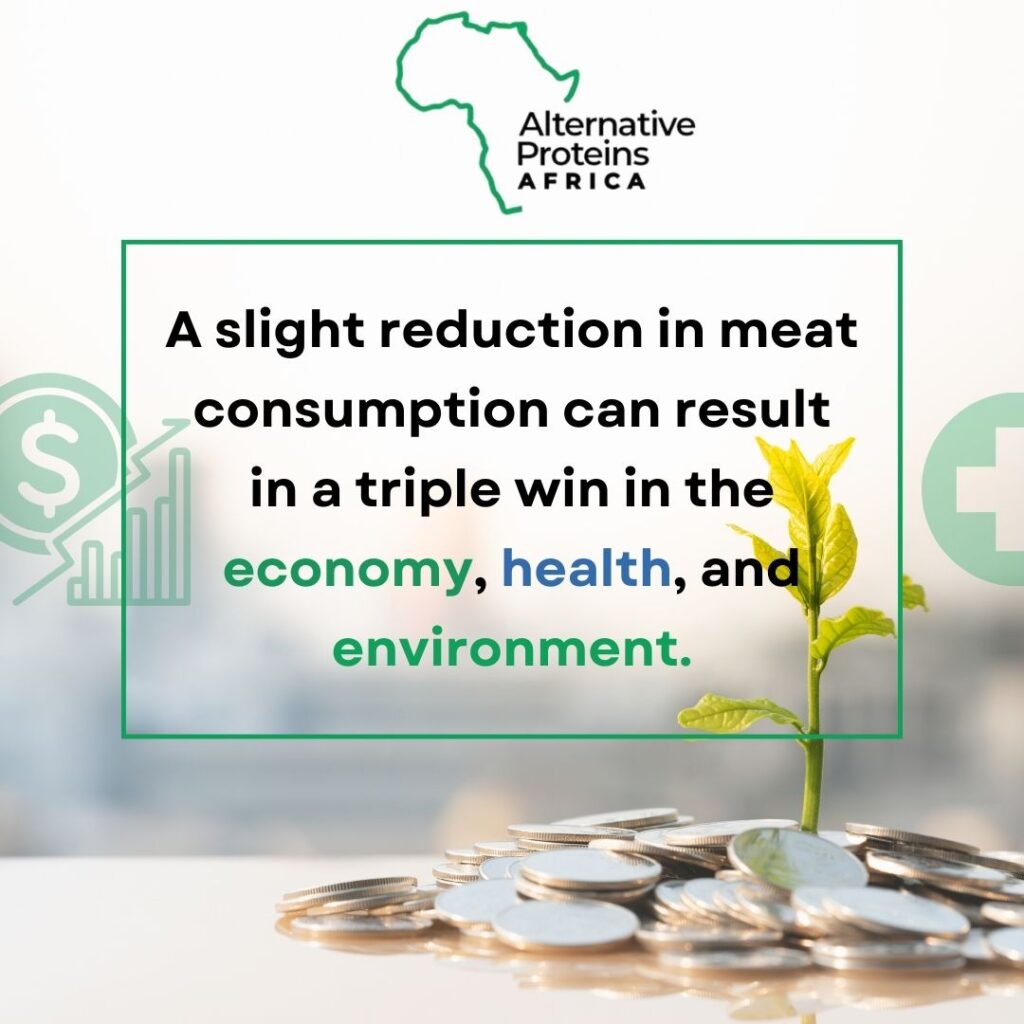
Introduction
Meat consumption has long been a part of our diets, serving as a source of proteins and other vital nutrients. However, as we experience an increasing rise in our population and face global health and environmental challenges, it has become crucial to reassess and adjust this pattern. A growing body of evidence indicates that even a slight decrease in meat consumption to accommodate more sustainable alternatives can positively impact our economies, health, and the environment. While the health and environmental benefits of adopting alternative proteins have often been emphasized, we must also consider their economic significance.
Economic Impacts of a slight reduction in meat consumption
A modest reduction in meat consumption can ultimately have significant economic benefits. In a report by the Conservative Animal Welfare Foundation (CAWF), researchers found that if the British population could eat meat-free lunches on weekdays, the resultant improvement in health could save the National Health Service (NHS) a whopping sum of £2.2 Billion yearly. Below are some of the impacts of reducing meat intake on the economy.
Reduction in Healthcare Expenses
One significant economic implication of the reduction in meat intake is its potential to reduce the expenses on healthcare. Lifestyle diseases such as obesity, cardiovascular disease, and certain cancers are associated with high meat intake. Treating and managing these diseases greatly impact the finances of any individual or country. The £2.2 Billion that can be saved annually by the UK NHS by cutting down on meat consumption is a testament to this.
Similarly, in another study by the Oxford Martin School researchers, they found that such dietary change on a global scale could culminate in an annual cost savings of $700-$1,000 billion (US) on healthcare, unpaid informal care, and lost working days. One can reduce the potential of developing these lifestyle-induced diseases by opting for more plant-based diets. This consequently leads to a reduction in healthcare expenditure for both individuals and the larger society. This is especially of great importance to the African continent, which faces inadequate healthcare financing.
Household cost saving
Another benefit is the impact it has on the finances of a household. Reducing one’s meat intake will substantially lead to cost savings. The same report attests to this reality. It asserts that the average British household could replace 20% of their meat consumption while saving over £130 annually. The report further reveals that no matter what we replace meat with, we’re still likely to save money. However, a shift towards healthy plant-based diets offers more economic benefits to households. Several other studies also confirm this. Thus, changing to more plant-based diets will significantly affect household finances, allowing one to make prudent economic choices while preserving the need for high nutritional standards.
Empowering Local Economies
Additionally, reducing meat consumption can empower the local economy, creating more opportunities in the alternative protein industry. An increase in demand for a plant-based diet will increase efforts in research and investment. This will, in turn, encourage smaller-scale farming within communities, leading to job creation in the various value chains of production.
Health and environmental impacts of a slight reduction in meat consumption
Adopting more alternative proteins, which by implication reduces meat consumption, has excellent impacts on the health of humans, the environment, and, in fact, that of animals. For better insight, we recommend that you read this article, which examines the impacts of alternative proteins on these three components.
In terms of environmental benefits, the CAWF report further highlights that “reducing British meat consumption by 10% (e.g. eating 2 fewer packs of sausage per family per month) would offset the emissions of 16% of the cars on UK roads”. This finding suggests that reducing meat consumption by 10%, equivalent to two fewer packs of sausages per family monthly, could be as impactful as taking 16% of cars off the roads in terms of emissions. By extension, this signifies the improved environmental outcomes of dietary choices and their potential to contribute to global sustainability goals.
What relevance does this hold for Africa?
While the statistics presented for British society might not represent African society, the reality is similar. Adopting plant-based diets will benefit our economy, health, and environment. Fortunately, the typical African community’s agrarian orientation gave it an advantage to benefit from this plant-based revolution. Unlike most urban regions, whose industrialization often disconnects them from agriculture, Sub-Saharan Africa is home to vast arable land, contributing 60% of uncultivated arable land globally. Addressing the lack of investment and technique sophistication, labor shortage, and low productivity characteristic of our agriculture system will, therefore, position us to reap on a larger scale from this ongoing revolution.
Conclusion
Sufficient evidence-based research to further show how much the plant-based shift is to benefit us is necessary. Such evidence will better inform the public and African policymakers about the benefits of reducing meat consumption and enable us to make informed decisions. Also, there is the need for ‘home-grown’ innovative solutions to transform our food systems in Africa. Data-driven insights like this will, in no small way, help facilitate these solutions.

